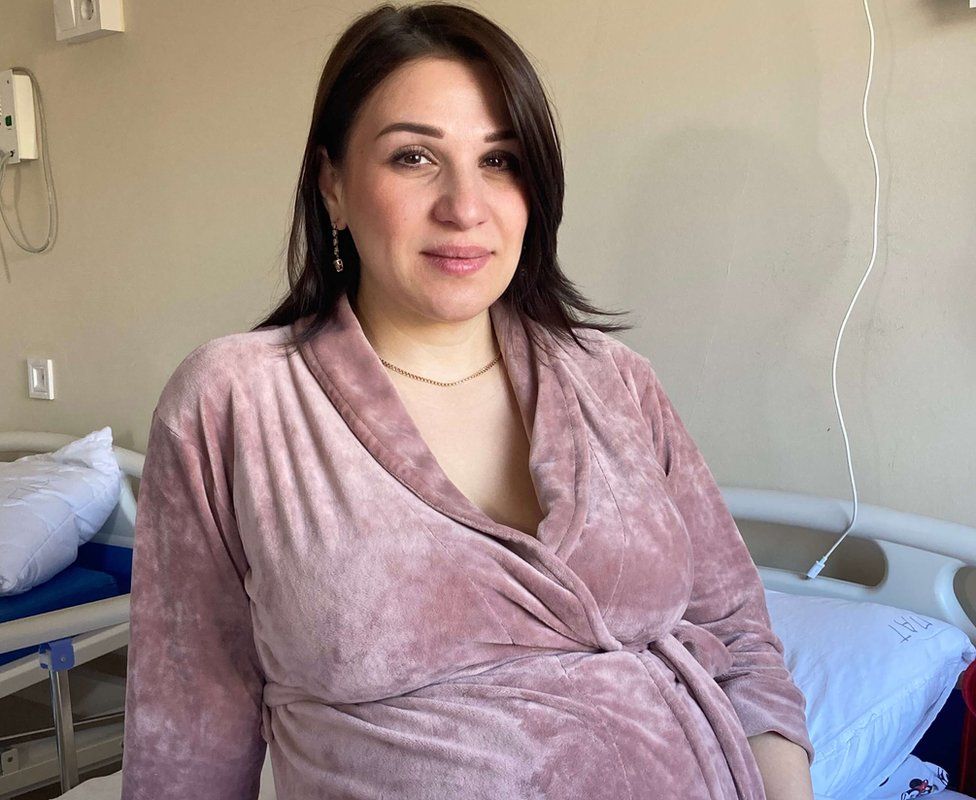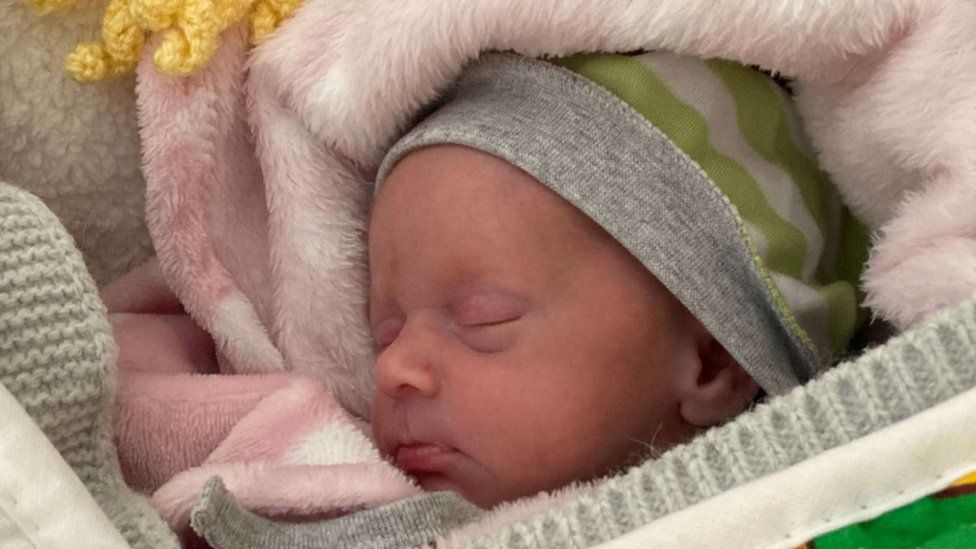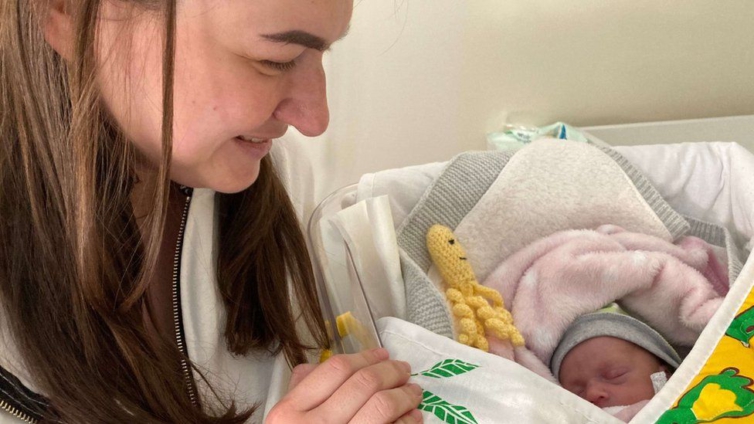Doctors have begun seeing a sharp rise in the number of premature births in some areas of Ukraine, as the conflict enters its second month.
Prenatal clinics in both Kharkiv and Lviv have told the BBC that the rate of preterm births has doubled or tripled in the past few weeks, as a result of stress and medical issues linked to the war.
Polina was born in Kharkiv's regional perinatal clinic weighing just 630g (1.4lbs). The average weight for a full-term baby girl is five times that.
Viktoria, 800g (1.7lbs), was born in Lviv's perinatal hospital in early March along with her twin sister Veronika, after her mother fled from Kyiv. She's just passed her first kilogram.
These two little girls, one a refugee, the other struggling for life in a city bombarded by Russian forces, reveal the gruelling choices facing mothers and doctors here.
Iryna Kondratova, the medical director in charge of Polina's care, told me premature births had jumped to three times their normal rate at her Kharkiv clinic, and now account for 50% of all deliveries.
"Infections, lack of medical help, bad nutrition: war creates a risk of premature birth," Dr Kondratova says. "Our premature birth rate was already high, because we had a lot of patients from Donetsk and Luhansk.
"In conflict zones, women spend a lot of time in crowded basements, where infections are active. And it's also harder for women to reach medical help if they need it."

While the percentage of premature births in her clinic has risen, Iryna says the total number of her patients has shrunk, as women flee the fighting in Kharkiv.
Across the country in Lviv, away from the front lines, they've seen an influx.
Viktoria's mother, Iryna Zelena, fled to Lviv from Kyiv just before she gave birth. "We left because of mass shelling," she says. "We'd been in a shelter all that time."
She believes the stress of spending the first days of the war in a bunker contributed to her delivering Viktoria - and her twin sister Veronika - more than seven weeks early.
Down the corridor, in the pre-natal unit, Olga Bogadiza is six months pregnant and also expecting twins. She fled from Kyiv too, desperate to find somewhere safe to have her babies, away from the shelling and curfews.
It took three days to reach Lviv, she says, and during all that time she couldn't eat or drink from fear.
"Have you heard of the saying, 'animal fear'?" she asks me. "It's not like the fear of pain, or giving birth - it's fear that makes your skin hurt. You're so scared you can't eat or think. When I arrived in Lviv, the doctor said I had lost 3.5kg (7.7lbs), and that my babies' lives were in danger because their development had stopped."

Her twins have now started growing again. Her five-year-old son asks her on every visit when his brothers will come.
Olga is Russian, her husband Ukrainian. Their children are a refuge of love to cling to with their countries at war.
But as Russian missiles slammed into targets in Lviv, the challenge of caring for fragile babies like Viktoria and Polina was brought home.
In Kharkiv, Dr Kondratova says staff had made the decision to stay on the intensive care ward with the smallest babies, even after air-raid warnings.
"You can't take a child of 600g to the basement," she said. "It would be a one-way trip. So we stay with the children and live through the bombings with them."
For Viktoria's mother, Iryna, the air-raid sirens pose a difficult dilemma.
Viktoria's sister, Veronika, has already left intensive care and is staying with her mother on the general ward. When the siren sounds, Iryna takes her down to the bomb shelter - but has to leave Viktoria behind in her incubator, because she's too fragile to move.
"Emotionally, it's really hard," Iryna said. "It's like tearing my heart in two. One baby comes with me, the other stays with the doctors. I'm always thinking, 'is everything ok? How does she feel?' But in this situation, we just have to be strong."

The hospital in Lviv - a city once seen as a safe haven from the conflict - has already sandbagged some windows, but it is also now building a special underground bunker to house its most fragile patients in incubators.
Hospitals have been a target in this war, and staff here are worried.
Within this conflict that has gripped the world, babies like Viktoria and Polina are waging their own fight for survival.
Iryna strokes her daughter's hand inside the incubator.
"She's Ukrainian," Iryna says, "and she's going to win."
Latest Stories
-
David Ocloo resigns as assistant coach of Asante Kotoko
31 minutes -
Josh Acheampong to sign new at Chelsea until 2029
37 minutes -
Akufo-Addo hails peaceful 2024 election as testament to the resilience of Ghana’s democracy
44 minutes -
SIC Insurance Plc poised for success as it holds its AGM
1 hour -
“You need to think smarter” – KK Fosu on Fameye’s stage mishap
1 hour -
LA 2028: Ghana cannot win medal without state support – Bawah Fuseini
1 hour -
Legon Cities: Paa Kwesi Fabin offers to resign amidst turmoil
1 hour -
CHAN 2024Q: Black Galaxies ready to match Nigeria for quality
1 hour -
We want to know who is funding Mahama’s anti-corruption committee – Afenyo-Markin
1 hour -
Our legendary boxers deserve statues, not Akufo-Addo – Nii Lante Vanderpuye
1 hour -
We’ll do honest and impartial work – Ablakwa
2 hours -
Supreme Court dismisses petition against constitutionality of anti-gay bill
2 hours -
Checkmate: Unpacking the role of ‘Pawn’ in Ghana’s cinema
2 hours -
CHAN 2024: ‘There is a bright chance of qualification’ – Didi Dramani on Nigeria clash
2 hours -
CHAN 2024Q: Black Galaxies coach Didi Dramani ‘refining’ players ahead of Nigeria clash
2 hours

